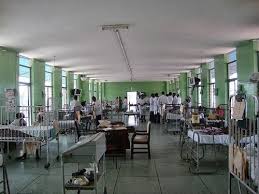Their optimism was fueled by the fact that the newly – appointed ministers understood the system, the challenges, and bottlenecks, as one of them, worked closely with his predecessor, Prof. Isaac Adewole, the immediate past minister.
Having carefully examined the sector, the president, Health Writers Association of Nigeria (HEWAN), Chioma Obinna, said the disease burden would drop drastically if the challenges affecting primary healthcare centers (PHCs) are addressed properly.
“There is a need for improved efforts to reduce maternal and child mortality and morbidity, which has continued to be on the increase. Also, there is a need to investigate and prosecute cases of negligence in the hospitals to serve as a deterrent and build confidence in the health system.
“The association believes that paying attention to the inter-professional rivalry in the public health sector should be among the first steps by the new health minister. There should be zero tolerance for discord in the sector.”
Based on the available evidence, HEWAN believes that Nigeria cannot achieve universal health coverage (UHC) if health insurance remains optional.
In the same vein, the director of communication, Diabetes Control Media Advocacy Group (DICOMAG), Mrs Yinka Shokunbi, while congratulating the minister of health and minister of state for health, urged them to make the control of diabetes a major priority during their tenure.
“Last year, experts at a stakeholders’ meeting on diabetes foot care raised the alarm that Nigeria is currently recording an unacceptable number of lower extremity amputation and death resulting from diabetes foot ulcer in all parts of the country.
Different studies in Oke-Ogun area of Oyo State, Port Harcourt in Rivers, Ile Ife in Osun State, the rural communities in Gombe, Enugu, Kwara, Borno, Zaria, Uyo, Sokoto, among several others, all indicate that diabetes is not only prevalent, it is contributing to the development of heart disease, renal disease, pneumonia, bacteremia, and even tuberculosis (TB) in all the places.
“While neighbouring countries like Cameroon now provide insulin free of charge to children and other countries have adopted policies to assist citizens to achieve control of the condition, virtually all the states in Nigeria have remained silent.
“Honourable Minister, we are aware that your predecessor instructed federal health institutions to commence blood sugar testing as part of routine tests for all patients visiting the hospital. We are also aware that most hospitals have not adhered to the instruction mainly because of funds that will be involved in such procedures.
“Obviously, this calls for proper funding of the nation’s diabetes control efforts. For a start, we urge that you kindly ensure an immediate budgetary allocation to the diabetes desk of the department of non-communicable diseases, beginning from the 2019 budget to enable the desk to commence urgent massive enlightenment campaign about diabetes.”
Addressing the issue of brain drain, Dr. Solomon Avidime, from the Departments of Radiology, Obstetrics and Gynaecology, Ahmadu Bello University Teaching Hospital, Zaria, Nigeria, said about 5861 Nigerian physicians were currently working in the United Kingdom in 2018, according to a report of 10-year (2009-2018) migration trend of trained Nigerian physicians.
With a population estimate in excess of 200million and only about 40,000 physicians practicing in Nigeria, there are not enough doctors in Nigeria because the doctor to population ratio is 1: 5,000 as against the WHO recommended 1:600
Averting the trend, Avidime said if developing countries can provide world-class education and training opportunities, as well as opportunities for unhindered career advancement and employment devoid of any form of discrimination, ethnocentric considerations, the migratory flow can be reduced.
Institutional capacity would have to be expanded to accommodate more prospective students for the study of medicine at both undergraduate and postgraduate levels, said Avidime, adding that the resultant effect is a doubling effect on the current output from the medical schools and the Nigerian government, MDCN and the NMA would play a complementary role in this regard.

 For the past few weeks, the news of the appointment of two health professionals as Ministers of Health and State for Health by the President Muhammadu Buhari has been well celebrated and the reason for that is not far-fetched.
For the past few weeks, the news of the appointment of two health professionals as Ministers of Health and State for Health by the President Muhammadu Buhari has been well celebrated and the reason for that is not far-fetched.




